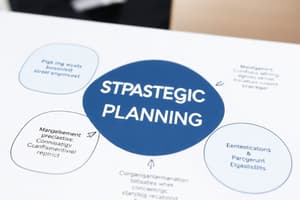Podcast
Questions and Answers
What did Peter Drucker emphasize as the most important task for leaders?
What did Peter Drucker emphasize as the most important task for leaders?
- Implementing new technologies
- Formulating goals and objectives (correct)
- Hiring and training employees
- Managing financial resources effectively
Which stage of the planning process involves analyzing market trends and competitors?
Which stage of the planning process involves analyzing market trends and competitors?
- Developing the strategic plan
- Reviewing past performance
- Analyzing the external and internal environment (correct)
- Defining the organization's mission
What does planning help establish for organizations?
What does planning help establish for organizations?
- High employee turnover
- Employee satisfaction
- Cohesive strategies (correct)
- An unclear vision
Why is defining the organization's mission, vision, and goals an important initial step in planning?
Why is defining the organization's mission, vision, and goals an important initial step in planning?
What does the strategic plan for an organization typically outline?
What does the strategic plan for an organization typically outline?
What distinguishes tactical planning from strategic planning?
What distinguishes tactical planning from strategic planning?
What is the primary purpose of contingency planning?
What is the primary purpose of contingency planning?
How do modern planning tools facilitate efficient planning processes?
How do modern planning tools facilitate efficient planning processes?
In the context of planning, what does operational planning primarily focus on?
In the context of planning, what does operational planning primarily focus on?
What role does monitoring progress play in the planning process?
What role does monitoring progress play in the planning process?
Flashcards are hidden until you start studying
Study Notes
Mastering Management: The Art of Planning
Planning is an essential component of successful management, guiding the vision, direction, and actions of organizations towards their goals. In this article, we'll explore the principles of planning within the realm of management, using real-world examples and insights to illustrate the importance of this foundational skill.
The Significance of Planning in Management
In the words of one of management's greatest thinkers, Peter Drucker, "The only thing of real importance that leaders do is to formulate the goals and objectives of their organizations." Planning establishes the roadmap to achieve these goals, aligning resources and efforts to create a cohesive strategy that drives organizations forward.
The Planning Process
Planning is typically a cyclical process that involves several key stages.
-
Defining the organization's mission, vision, and goals: This lays the groundwork for all other planning activities, ensuring that everyone within the organization understands its purpose and aspirations.
-
Analyzing the external and internal environment: Analyzing market trends, competitors, and internal capabilities helps managers make informed decisions about strategic direction.
-
Developing the strategic plan: This plan provides a high-level roadmap for the organization, outlining its objectives, strategies, and tactics to achieve its goals.
-
Preparing tactical plans: Tactical plans are more detailed, focusing on specific projects or initiatives that contribute to the achievement of strategic objectives.
-
Monitoring progress and adapting plans: Ensuring that the planning process is ongoing, regularly evaluating progress, and updating plans as needed to reflect new information and changing conditions.
Types of Planning
Planning can be classified into several categories, each focusing on different aspects of the organization.
-
Strategic planning: This type of planning focuses on the organization's long-term goals and objectives, addressing broad questions related to its mission, vision, and future direction.
-
Operational planning: Operational planning is concerned with the day-to-day activities required to achieve the organization's goals. It involves creating detailed plans for the allocation of resources, the completion of tasks, and the monitoring of progress.
-
Tactical planning: Tactical planning lies between strategic and operational planning. It focuses on the implementation of strategic objectives, identifying specific projects or initiatives to accomplish broader goals.
-
Contingency planning: This type of planning focuses on planning for potential risks and uncertainties. Contingency plans are developed to address various scenarios, such as natural disasters, cyber attacks, or other threatening events, and to ensure the continuity of the organization's operations.
The Role of Technology in Planning
Modern planning tools and technologies, such as project management software, collaboration platforms, and data analytics tools, have made it easier to execute complex planning processes. These tools enable managers to visualize, analyze, and track progress, facilitating more efficient and effective planning.
Conclusion
Planning is a fundamental element of successful management that helps organizations focus on their goals, align resources, and make informed decisions. By understanding the principles of planning and implementing effective planning processes, managers can guide their organizations towards achieving their aspirations. As the world evolves, so too must our planning processes, adapting to new technologies and methodologies to meet the demands of the modern business landscape.
References:
- dmitryd/typo3-dd_googlesitemap (irrelevant to the topic)
- Startpage - Private Search Engine (irrelevant to the topic)
- No Search For (irrelevant to the topic)
- Bing Chat To Add Feature To Not Search The Web (irrelevant to the topic)
- Did you know? You can add "#no_search" at the end of your message, and Bing won't search the internet for an answer (irrelevant to the topic)
- Drucker, P. F. (1967). The Effective Executive: The Definitive Guide to Getting the Right Things Done. Harper & Row.
Studying That Suits You
Use AI to generate personalized quizzes and flashcards to suit your learning preferences.




